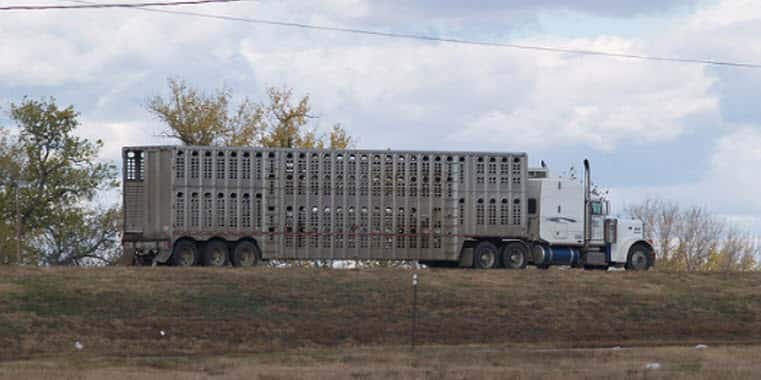This week, Montana Senator Jon Tester was joined by Senator Deb Fischer (R-NE), Senator Roger Wicker (R-MS), and Senator Tina Smith (D-MN), to introduce a bill that would deliver much-needed flexibility for livestock haulers.
The Haulers of Agriculture and Livestock Safety (HAULS) Act of 2021, increases hours-of-service flexibility for ag and livestock haulers, allowing for more efficient transportation of agricultural commodities.
“Ranchers and livestock haulers face unique challenges when transporting perishable crops and live animals, and the rules should reflect that,” said Tester. “This commonsense bill cuts the burdensome red tape that can prevent ag and livestock haulers from doing their jobs safely, and gives them the flexibility to ensure more of Montana’s world-class products can make it to market.
Hours-of-service (HOS) requirements by the Federal Motor Carrier Safety Administration’s (FMSCA) limit the time a commercial driver may be on duty to 14 hours and driving to 11 hours. Congress granted limited exceptions to these requirements in 1995, but due to the perishability certain commodities, ag and livestock haulers still face challenges ensuring their products make it to their destination.
Tester’s bipartisan HAULS Act modifies the Motor Carrier Safety Improvement Act of 1999 by updating the ag and livestock HOS exemptions with three key provisions:
- Eliminating seasonality — Current HOS exemptions for ag and livestock haulers apply only during state-designated planting and harvesting periods, despite the growing diversity of crops and agricultural practices that can result in the need for product hauling throughout the year. The HAULS Act strikes the burdensome seasonal limitation on HOS exemptions, ensuring they are available year-round for ag and livestock haulers across the country.
- Adding 150 air mile HOS exemption to destination — In 2018, FMCSA released guidance stating that ag and livestock haulers may begin recording their HOS after crossing a radius of 150 air miles from their beginning location. The HAULS Act provides a similar 150 air mile HOS exemption to the destination of an ag or livestock hauler’s haul to account for the additional time needed to safely navigate rural and minimally maintained roads.
- Clarifying ‘agricultural commodity’ definition — The HAULS Act identifies general ag and livestock products that are either non-processed or minimally processed to fall under FMCSA’s ‘agricultural commodity’ definition, allowing haulers moving these products to utilize the ag and livestock HOS exemptions.
The HAULS Act is supported by 102 ag and livestock organizations, including the Montana Stockgrowers Association Inc, Montana Agricultural Business Association and the National Cattlemen’s Beef Association.
“One year after COVID-19 began to disrupt daily life across the country, U.S. cattle producers continue to prove each day that they are committed to keeping grocery stores stocked with beef. Livestock haulers are a critical component of the beef supply chain and flexibility in livestock hauling regulations remains vital,” said NCBA President Jerry Bohn. “NCBA strongly supports this bipartisan effort to provide livestock haulers with the flexibility they need to maintain the highest level of safety on the roads, transport livestock humanely, and ensure beef remains available to consumers.”
Current hours-of-service (HOS) rules allow for 11 hours of drive time, 14 hours of on-duty time, and then require 10 consecutive hours of rest. When transporting livestock, there is a real need for further flexibility beyond the current hours-of-service. Unlike drivers moving consumer goods, livestock haulers cannot simply idle or unload their trucks when drive time hours run out without jeopardizing animal health and welfare.
“NCBA has long advocated against one-size-fits-all regulations for the live haul sector, and the COVID-19 pandemic further highlighted the need for flexibility when it comes to livestock hauling. The HAULS Act represents the best long-term solution — a permanent change to existing hours-of-service regulations that preserves animal welfare as well as safety on our roads, while also making sure producers can keep our grocery stores stocked with beef,” said NCBA Executive Director of Government Affairs Allison Rivera. “We thank Senator Fischer, Senator Tester, Senator Wicker, and Senator Smith for their work on this important legislation. NCBA will continue working on behalf of producers and haulers to provide flexibility within the current hours-of-service.”
Full text of the HAULS Act can be found HERE.
###
Sen. Jon Tester/NCBA


